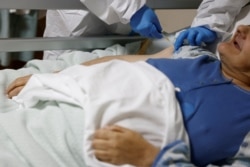Vaccine inoculations have begun in Italy for medical staff and the most vulnerable, but the country’s daily death toll continues to be well over 500.
All Italian primary school students and most middle school students returned to face-to-face lessons on Thursday. But not all regions in the country have agreed to re-open their schools to younger students due to very high numbers of COVID infections in some places.
In at least four regions the return of middle school students has been delayed. Regions also adopted different decisions for high school students, but most were being allowed to return to face-to-face classes next Monday, as Education Minister Lucia Azzolina explained on Italian national television.
The minister said five million younger students would be returning to school on Thursday. These are the same students, she said, who were already attending classes during the second wave. The government, Azzolina added, has also authorized 50 percent of high school students to return to in-person classes next Monday and the other 50 percent will continue with distance learning.
The relief group Save the Children this week warned that the pandemic has had severe effects on the lives of millions of youngsters who have faced difficulties with distance learning due to lack of technology and possibilities to study online.
Protests broke out Thursday throughout Italy against the failure to reopen schools to all students.
Italy continues to enforce COVID restrictions in spite of the tight measures taken over the Christmas season. More than 20,000 new infections were reported on Wednesday and the daily death toll stands as well over 500.
Meanwhile, Covid vaccine inoculations began before the end of the year, first with medical staff and the most vulnerable.
More than 320,000 Italians have been inoculated so far with the Pfizer-BioNTech vaccines that have been distributed across Italy. The regions of Lazio, Tuscany and Veneto in particular, have managed to quickly use most of the doses available to them. The Moderna vaccine will also soon start to be used in Italy after it received approval and up to 1.3 million doses will be available in Italy in the first quarter of this year.
The Italian government aims to vaccinate six million people by the end of March, 14 million by the end of April and the remainder of all those who accept to be vaccinated by the end of August. Vaccination is voluntary.





